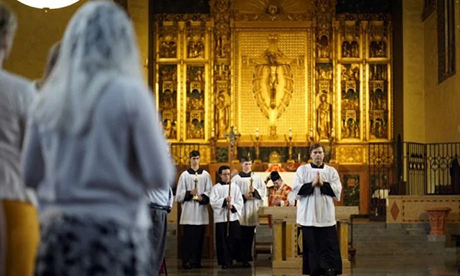The fallout from Pope Francis’s decision to restrict celebration of the pre-Vatican II Latin Mass continues to grow as angry traditionalist Catholics push back.
On Friday, the Vatican published a new motu propio, titled Traditionis Custodes, which tightened permission for celebration of the Traditional Latin Mass, the use of which had been liberalized under Benedict in 2007.
According to Crux, liturgy expert and editor at the New Liturgical Movement blog Gregory DiPippo said that when he heard the news, he was filled with “profound sadness and dismay at the idea that the pope would so cruelly mistreat so many of the faithful.”
DiPippo says the move is seen by enthusiasts of the Latin Mass “for what it is, a declaration of war, and a statement of intent to drive people who did not fit into the pope’s ideological vision of the Church out of it.”
Catholics who prefer the Latin Mass “have been sent the very clear message that they are not welcome or wanted in the Church, and that the Holy See now formally rejects all idea of undertaking their pastoral care,” DiPippo said.
“However, they are as a group very well catechized. They know that the Church is not the Pope’s personal plaything which entitles him to maltreat the faithful in this fashion.”
In a letter to the world’s bishops published alongside the July 16 motu proprio, Pope Francis said that in the 13 years since Benedict XVI broadened access to the Latin Mass in a bid to foster unity, that openness has been “exploited” to create divisions.
DiPippo rejected the idea that restricting the Latin Mass was done to promote unity, calling the claim “a blatant falsehood.”
The pope’s decision, he said, “will unquestionably divide Catholics further. I think that even many of those who have no particular sympathy for the traditional liturgy or its follows will be repelled by the callous lack of pastoral charity which this change evinces.”
In a statement Friday, Joseph Shaw, Chairman of the Latin Mass Society of England and Wales, said Francis’s if the new norms are strictly implemented, it would “drive a great many faithful Catholics, who desire nothing more than to attend the ancient Mass in communion with their bishops and the Holy Father, to attend celebrations which fall outside the structures of the Church, above all those of the Society of St Pius X.”
“These Catholics have worked hard over many years, particularly since 2007, to build up the unity of the Church, which as the Second Vatican Council declared does not depend on liturgical uniformity but on unity of faith under the Pope,” he said.
“We would challenge any apologist for this document to produce real evidence that the [extraordinary form] has undermined the unity of the Church,” Shaw said.
